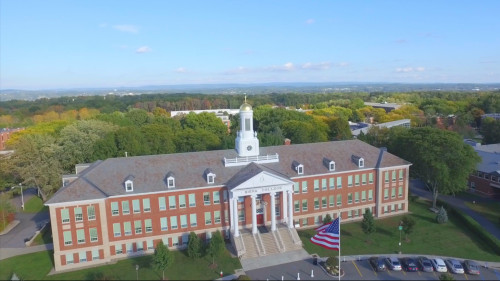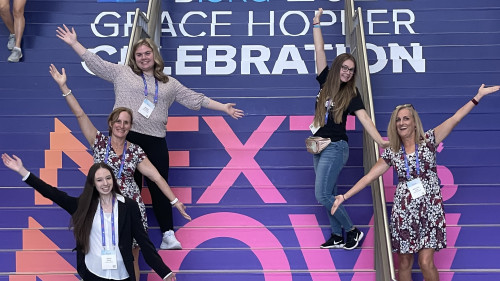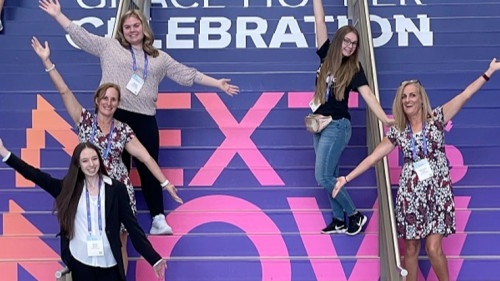
Updated October 5, 2023
With their country torn by war, thousands of students in Ukraine – from primary school to university – are trying to continue their education online from refugee centers, bomb-damaged homes and targeted apartment buildings. That is, if they have access to a laptop or other device, and the WiFi holds out.
A dearth of laptops in Ukraine means that many students are keeping up with their lessons on a parent’s smartphone, if at all. To address this need, the Siena community is spearheading a used laptop drive for Ukrainian students, as well as used tablet devices for small children.
Dmitry Burshteyn, Ph.D., associate professor of psychology, and Jami Cotler, Ph.D., associate professor of computer science, are organizing the drive to assist the non-profit Ukraine Friends in its ongoing efforts to deliver humanitarian aid to the people of Ukraine.
How to help:
- Siena community members can contact dburshteyn@siena.edu to drop off a used laptop, tablet device or USB-C charger. (All devices will be completely wiped to their original settings.)
- The public can drop off devices at Siena’s Public Safety office.
- Area businesses or schools that might be able to donate laptops, or connect with Ukrainians to offer tech support, a chance to practice English language skills, or just offer a friendly hello, should contact dburshteyn@siena.edu or jcotler@siena.edu.
“The big picture is that many Ukrainians have been displaced, and about half the country’s students now have to rely on remote learning not only for their education, but as a link to the outside world,” said Burshteyn, who is himself a native of Ukraine. “When the very next day itself is uncertain, laptops are not only a teaching aide but a mental health aide as well.”
Siena’s ITS department is kicking off the drive with their verbal commitment to donate used laptops from a recent lab replacement, which will be completely wiped to their original settings. Ukraine Friends has partnered with the New York-based hardware management platform Revivn, so that all files and data will be removed before they are donated. Ukraine Friends will deliver the laptops personally to Ukrainian students.
Siena will also reach out to schools, businesses and residents throughout the Capital Region to raise awareness about the need and hopefully gather more laptops. With local students starting school in the coming weeks and family purchases of new laptops or school district purchases of new Chromebooks to replace older models, the team is hoping for a sizeable yield of hardware for donation. Ukraine Friends said computer software is generally easy to come by; it's the hardware (laptops) that are greatly needed. Many of them, and soon. They don't need to be top of the line or even new: used is fine, but not too old.
“We have been told that the need is greater than can be imagined,” said Cotler.
Siena will be helping even more: Ukrainians are looking for instruction on cybersecurity, which our faculty and students could provide. Computer science major Ethan Tubia '24 is already in contact with a Ukrainian student for this very purpose. Also, there is an effort underway in Ukraine to encourage soldiers and citizens to learn English. Siena faculty and students can assist by offering instruction or simply the opportunity for Ukrainians to have informal chats and practice their English language skills.
“Ukraine has declared that English will be its international language, and they want their citizens to communicate with the rest of the world,” said Burshteyn. “Language skills are needed as well the opportunity to practice, so that the old Ukraine can transition to the new Ukraine.”
“Given the trauma Ukrainians have been experiencing for the past months, their deprivations, and their isolation from the rest of the world, any friendly connections that can be made through the Internet would be very welcome,” said Cotler.
Tubia has been working with a fellow student in Dnipro, Ukraine (and his sister, who attends college in the U.S.) to learn cybersecurity concepts together. The connection goes beyond sharing technical knowledge.
“This opportunity is allowing us as a group to set a precedent for how we can further assist the Ukrainian people,” said Tubia. “It is not just to help in the area of academia, but offering a mental health resource so these students know they can reliably reach out to others during a time riddled with uncertainty. I hope this initial setup can expand beyond cybersecurity, or even computer science. I want to help create a resource for Ukrainian students to reach out to for assistance in any subject.”
He will encourage members of Siena’s STEM clubs to get involved in tech support for their Ukrainian counterparts. Burshteyn and Cotler suggested that other Siena students can get involved by simply providing friendship, emotional support and English language practice.
The two professors are planning a course for spring 2024 with a travel component to Poland where Siena students will engage in service learning and interact with Ukrainian refugees. The course will focus on issues of resilience and trauma, informed by UX design.

